- Home
- Alexandra Bracken
Wayfarer Page 16
Wayfarer Read online
Page 16
“I think it’s just this way,” Sophia said. “Remind me to nick a harmonica if we ever find ourselves past the eighteenth century again. Finding the passage by resonance would make this bloody mess a great deal easier.”
They ventured down the steps, the seats, toward the main stage at the center of it all. Dust flew up around Nicholas’s feet, staining his damp shoes, filling his lungs. He squinted into the dark, but the only indication the passage was nearby was a faint tremor that crawled along his skin.
“I’ll check this way,” he called to Sophia, who was walking the perimeter of the amphitheater above him.
Nicholas turned to make his way down the next set of steps, which seemed to lead into some sort of partly collapsed pathway or room beneath the section of seats.
“I’ll take the lower level, if you search—”
He walked into a shivering patch of air—and walked face-first into a cold, crushing pressure that stole the breath from his lungs and seemed to wrench his heart clear out of his chest.
BEFORE HIS MIND MADE SENSE OF WHAT HAD HAPPENED, before his body seemed to wake to the fact that he’d stumbled onto the passage, he was drowning—salt water rushed into his lungs as he gasped in alarm, choking him. Water—water—he was caught in a rolling current, feet over head, feet over head, tumbling—
Nicholas kicked his legs to break out of the riptide, his mind so disordered his vision blackened like tar. He couldn’t find the surface of the water—it was all darkness, darkness and the moaning drum of the passage, which made the water around him beat with a frantic rhythm.
Do not panic, get ahold of yourself—bloody hell—bloody passage—
And bloody Sophia, as well, for not so much as alerting him to the fact that some madman had hidden the passage underwater.
Salt water turned his eyes raw, but he kept them open against the burn. His entire chest ached with the need for air. He wasn’t going to drown, damn it all. But it was night, and without a good glow from the moon or fire, it was nearly impossible to tell up from down. He forced himself to stay still, feeling for the current. Just as he was about to start swimming in the natural direction his body wanted to float, there was a burst of movement beneath him, almost like an undertow, as the passage exploded back to life and Sophia shot out of it. He reached down, gripped whatever part of her he could, and began to kick wildly in a direction he hoped was up.
Nicholas broke through the surface of the dark water with a rattling gasp, one hand clawing at the sky, as if he could haul himself up into the cool air. Sophia made a sound like a furious bird of prey as she followed, and Nicholas realized after the fact that he had drawn her up by her hair.
“Terribly—terribly sorry,” he managed to get out, his voice ragged from the water he’d choked down. “Forgive—”
“Quiet!” she snapped back. “Do you want them to find us? Swim!”
“Where?”
“Anywhere!”
Nicholas blinked, willing his eyes to adjust to the darkness. The water around them shook and waved in a peculiar, unnatural way. The clang-clang-clang he’d merely assigned to the passage was louder now and far more varied in speed and intensity, to the point where, at last, he knew more than one person was hammering and banging along.
Recognition sliced through him, a searing blade of alarm. It was the sound of something being built, of blades being hammered. It was a sound of war.
Above even that persistent clanging was a creaking sound, the moans of wood being strained and pestered by waves—a sound as familiar to him as his own skin. Ships.
Nicholas turned. A large circular arcade, almost coliseum-like, stretched around them, interspersed with columns that reached up high into the night sky, giving it the unified look of a portico. The sight was made all the more impressive by the ships berthed between them, waiting to be launched.
They were of a design unlike any he’d ever seen outside of etchings, with a smaller draft and almost flat across the deck like a barge.
He swam forward a bit toward the closest one, docked between the nearest two pillars of the arcade, his eyes roving over the openings for dozens upon dozens of oars. At the front, glaring back at him like a fiend, were two brightly painted eyes, and an enormous bronze piece at the bow, which, he imagined, would tear another ship apart when it was rammed—
He was yanked back by his collar before he could swim closer.
“Would you stop making eyes at that bloody ship? It’s a siege,” Sophia grated at him. “If they catch us, they won’t just kill us; they’ll make a whole show of it. Use our decapitated bodies to boost morale.”
Right. Yes. Siege. According to Hall, Rome had laid siege to its great rival Carthage for years, ultimately pillaging and razing the city to the ground and killing hundreds of thousands of its occupants. Depending on the timing of their trip, they might very well be eyewitnesses, if they did not get on with their business.
Wonderful.
Adrenaline flooded into Nicholas, warming his cold limbs, lighting up his mind and sharpening his thoughts. Behind them, at the very center of the arcade, was a mountain of a structure, a kind of watchtower constructed in four layers that grew smaller as it reached the top. The lowest layer, with all of its arches and columns breaking up the ship sheds, also seemed to serve as a dry dock—there were several skeletal frames of ships waiting to be completed.
But it was the highest level that intrigued Nicholas, that turned his heart cold in his chest. There, he could see torches—the shadowy outlines of men standing guard.
“Follow me,” Sophia said, taking a long, confident stroke toward a bridge that connected the watchtower to the entrance of the city. This time, he was the one to snatch her back, pressing a finger to his lips at her look of outrage and splashing.
This wasn’t a mere harbor—it was a military harbor, likely making it one of the best-protected and most -watched locations in the whole city. As a preventative measure, there would be few places they could use to slip inside of the city, and all would be defended.
He swiveled his head in the opposite direction. If Hall’s stories had been true…Nicholas’s eyes finally began to see through the veil of darkness, and—there it was. There wasn’t just one harbor in ancient Carthage, but two. One military, one merchant.
Nicholas had no doubt that the Romans had it well blockaded by now, but what mattered was that the merchant harbor would be far more open to the city. Merchants would need a way to bring their goods into the markets and conduct their trade.
Without wasting breath on explanations, he dropped beneath the cold waves and began to swim, his body taking to the water in long strokes. Nicholas came up for air only when necessary, and only slowly, to avoid splashing. Every few strokes, Sophia’s hand would brush his leg or foot, reassuring him she was still there. He kicked his way beneath the iron chain gate, the moonlight just strong enough to give him a glance of it as he swam beneath.
He hadn’t realized, until his stomach cramped and his limbs went as hollow as straw with effort, how long it had been since he’d last eaten, since he’d given them any sort of rest. How long he and Sophia had gone without more than a few bites of bread. The next time he broke through the surface for a breath, he made it a point to curb his nerves and stop to ensure Sophia was still keeping pace.
He waited.
The water in the harbor shoved at his back, rocking him, splashing into his eyes and nose as he kept low to the surface and waited for Sophia’s dark head to pop up again. Unlike its military counterpart, this harbor kept to a long, rectangular shape, allowing a few scattered ships to dock along it lengthwise, like fingers. Several shadowy figures moved steadily along the water’s edge, occasionally crossing paths as they moved in opposite directions.
A light patrol, then; the harbor was large enough that he felt confident all they needed to do was wait a few more moments, until the closest soldier moved out of sight. As he’d suspected, there were several low limestone buildings constructe
d along the harbor, their faces darkened by night. Those would be the warehouses used for storing goods. Some things never changed with time.
What he hadn’t expected was to find Sophia ahead, already climbing up from the water onto the docks. He watched in growing disbelief and, frankly, mild outrage, as she snaked her way toward the entrance of one of the warehouses, up behind one of the guards posted there with his back turned. She leaped onto his back, smothering him with one hand against his mouth and an arm banded over his throat. When another man emerged from the nearby warehouse, she pounced on him and did the same.
By the time Nicholas had climbed out of the water and ducked over to her, she’d already stripped the men of their tunics and shoes, as well as their swords. Nicholas accepted his with a pointed look of disapproval.
“Can you attempt to keep up?” she groused, turning her back to allow him to change.
“I will endeavor to do my best,” he said dryly, quickly tugging off his wet clothes and pulling on the soldier’s uniform with expediency as Sophia did the same. He bundled everything, including his soaking shoes, into his travel satchel. “Now where—”
A shadow melted away from the wall of the warehouse behind her, tucked into that very same pocket of blindness that had bedeviled her before.
“Move,” he breathed. “Move!”
But Sophia had, it seemed, already read the fear in his features, and she threw herself to the ground, just as a sword blade sang through the air, coming within a hair of scalping her. The sword instead slammed into the building, embedding itself so deeply, the attacker abandoned it in favor of another.
A curved dagger that stretched from the man’s finger like a claw.
A LANCE OF PAIN SLASHED across his shoulder blades. Nicholas was thrown forward by the force of the unseen hit, his breath exploding out of him. He whirled to see the last glimpse of a long spear disappear into the nearby water. Blackness threatened to swallow his vision as he rolled closer to the nearest building’s wall, trying to find cover from above.
Sophia—He searched her out, fuming and fearful. A hard gust of air and a grunt had him flying back, narrowly avoiding a new hooded figure as he slammed his sword down hard enough onto the stones for the blade to spark. It was close enough for him to see his own startled reflection in its surface.
Hell and damnation.
Nicholas ripped his own knife from his belt, parrying the swipe the first attacker took with the clawlike dagger. His forearm throbbed as it absorbed the shock of the blow, and he couldn’t pull back far or fast enough to avoid the bite of its tip at his chin. The cloak the man wore smelled of salt and sweat, and looked to have been cut from the night sky. It was only because the moon shone from so high above them that he could make out the embroidery stitched along its edges, the swirling pattern of what looked to be vines, or the powerful rays of a hundred small suns.
His attacker’s foot lashed out, hooking behind his knee, taking advantage of Nicholas’s unsteady balance and exhaustion. He crashed to the ground hard enough to see the lights of heaven behind his eyelids. As he tried to push himself off the ground, his right arm seemed to fill with white-hot needles and collapsed beneath him, aching.
A sickening thump struck the ground to his right, but Nicholas didn’t dare take his eyes off his attacker except to throw himself back onto his feet. His mind locked into the elaborate dance of death—strike, block, swipe, jab—the heat beneath his skin growing as he leaned into the fight. He allowed the towering man to back him up closer to Sophia, where she was now bending to retrieve her own knife from the neck of the shuddering body on the ground.
These attackers were all the same: black in the cloak, silver in the claw.
What the devil is this?
The attacker missed slicing the tip of Nicholas’s nose off, but clobbered him with a blow under the chin. Hard enough to knock that thought, and his brain, loose. Seeing double now, he couldn’t tell which of the split forms was the man, so he took a broad swipe at both. The claw lashed out, slicing up his arm, nearly puncturing his wrist. Closer, he saw the paleness of the man’s skin, the waxy quality of it, as if he had known nothing but night itself.
The attacker stumbled suddenly with a lurch and a gasp. Behind him, Sophia wrenched her knife out from where she’d jabbed it between his shoulder blades. Nicholas raised his wrist, but his arm still felt peculiar, heavier than it ought to have been, so slow that his next slash was blocked by heavy dark leather gauntlets. The attacker righted himself, keeping his claw on Nicholas and his blade on Sophia.
“You must be joking,” she said, eye white as a pearl in the dark.
He was not. If the man had split himself down his center and become two, he couldn’t have been any more effective than he was then, with his attention divided between them. Nicholas struck, Sophia struck, and he threw them back again and again. Nicholas felt every ounce of pent-up fury crest over his final bit of restraint. A last gasp of strength surged into his body, and, beneath it all, a single, cool thought.
Lure him in.
He feinted left, letting the man’s next hit knock the knife from his hand, letting him crowd closer. Sensing easy prey, the attacker moved in for the kill. The claw ripped the air in two, skimming over his throat as he leaned back.
Sophia slammed her blade into the base of his skull. The attacker’s hood was thrown back as he fell to the ground, his long, pale hair stained with bubbling blood.
The air heaved in and out of Nicholas, his lungs screaming for mercy as the red haze disappeared from his vision and that most basic instinct—to kill or be killed—abandoned him. He wiped his face with his sleeve, ignoring the way his hands shook.
“That was…” he began at the same time that Sophia said, “It’s the same weapon, isn’t it?”
Trying to rub away the prickling pain from his right arm, he glanced down, searching for a wound that might explain the slash of hot pain that stretched across the back of his hand. But there was nothing, not even a cut.
A word hissed through his mind, unbidden. Poison.
Impossible. If anything, he’d strained a muscle or given himself a sprain. This would resolve itself, with nothing so nefarious to blame.
But the sensation did not disappear. It worsened. There’d been longer and harder battles fought for his life that had left him feeling nowhere near the level of exhaustion overtaking him now, like a sudden illness. Nicholas coughed up dust he’d inhaled and spat out a wad of blood, retrieving the satchel from where it had fallen some distance away. The hollowness at his core spread as he checked to make sure the string with Etta’s earring was still around his neck, still safe. He clutched it in his left fist, as his right felt nearly too numb now to move.
Not good. Nicholas glanced down at the ring again, and forced himself to look away before his thoughts sank him any deeper into worry.
“Come on, we need to get rid of the bodies before—” Sophia interrupted herself midsentence, her gaze shooting up toward the warehouse above.
But Nicholas had seen the shadows first—five of them, fluttering around like ravens, jumping between the buildings with animalistic ease. Nicholas took her arm and forced himself into a run, moments before the first arrow cleaved through the air over their heads.
He looked up in time to see another shadow on a nearby roof. With the lingering traces of his composure, he hefted a large stone and threw it as hard as he could. It startled their attacker long enough for Nicholas to drag them under the cover of the nearby building’s overhang. But the pounding steps behind them didn’t cease, nor did the realization that they were running without any particular destination in mind.
Better to be like rats, he thought, and try to confuse a pursuing cat by taking as labyrinthine a path as possible. It was just a matter of finding the right hole to disappear into.
“Who are they?” Sophia gasped out.
The Belladonna’s men? The rogue idea cut up through the rest. She had taken particular interest in gettin
g the claw back, hadn’t she? She might have overheard where they were going and taken action after his refusal to serve her.
“I’m reasonably sure we should not stay to find out,” he told her, craning his neck just far enough to check for the shadowy figures on the roof. Seeing nothing but the clouds and stars, he motioned for her to follow, and picked up his punishing pace again.
The whole of the city reeked as though it had been boiling in its own waste for a month. It felt like climbing into a festering wound. Unwashed bodies, living and near-dead, blocked their path no matter which street they turned onto, sleeping scant inches away from rotting garbage—or, in a few sorry instances, using the rotting garbage as a kind of pillow against the unforgiving stone streets.
Sparks flew up, scattering across the night, as they passed a blacksmith busy beating a sword into submission despite the late hour. Feeling the unwanted prickling in his right hand again, he switched his knife to his left, and he kept his head down as they passed, only glancing at the pile of metal goods waiting to be melted down and re-formed, and the pile of finished, somewhat crude weapons waiting to be picked up and taken to battle.
There was a sliver of space between his workshop and the next building, an alleyway that curved around. He led Sophia into it, giving them a moment’s reprieve to catch their breaths.
“I think we’ve lost them—”
Sophia had cursed them with that. A darkly cloaked woman burst out of the streams of fabric that had been draped over lines to dry, like a wraith.
Without a second thought, Sophia tossed Nicholas the soldier’s blade she’d been carrying and, catching it, he whirled back, smashing the hilt against the attacker’s throat, stunning her. While she gasped, Sophia seemed to flow in, cutting the woman across her face with her knife. The moment the attacker hit the ground, pressing her hands against the flowing blood with a howl, they were running again.
The city curved before them like a question mark, laid out like a maze within a puzzle. Pale, sturdy limestone buildings leaned against their close neighbors, and lines of them stretched as far and wide as Nicholas’s eyes could see, culminating on a hill at the city’s heart. The homes rose not just two stories, but usually six or seven, as if the city had one day decided the best course was to grow up, rather than out. Much like, he thought with a sad sort of smile, the way Etta had described her Manhattan.

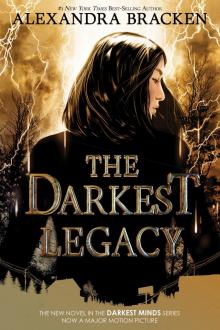 The Darkest Legacy
The Darkest Legacy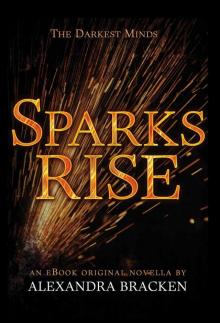 Sparks Rise
Sparks Rise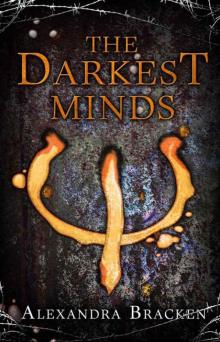 The Darkest Minds
The Darkest Minds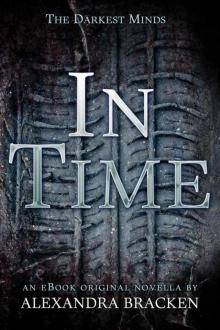 In Time
In Time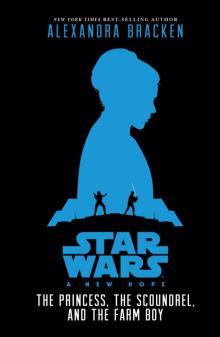 Star Wars: New Hope: The Princess, the Scoundrel, and the Farm Boy: Being the Story of Luke Skywalker, Darth Vader, and the Rise of the Rebellion (Novel)
Star Wars: New Hope: The Princess, the Scoundrel, and the Farm Boy: Being the Story of Luke Skywalker, Darth Vader, and the Rise of the Rebellion (Novel) Brightly Woven
Brightly Woven Wayfarer
Wayfarer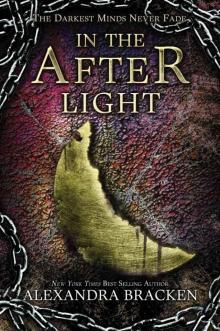 In the Afterlight
In the Afterlight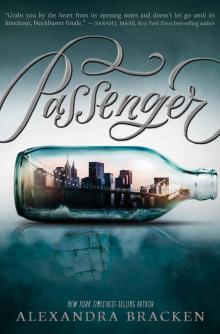 Passenger
Passenger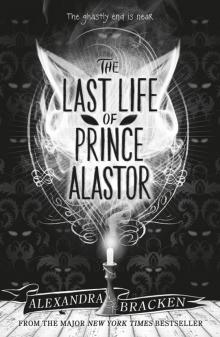 Prosper Redding: The Last Life of Prince Alastor
Prosper Redding: The Last Life of Prince Alastor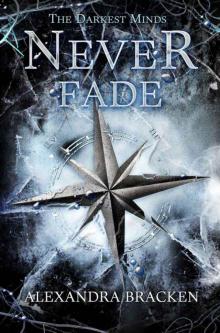 Never Fade
Never Fade Lore
Lore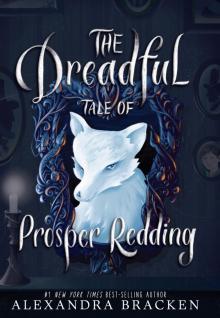 The Dreadful Tale of Prosper Redding
The Dreadful Tale of Prosper Redding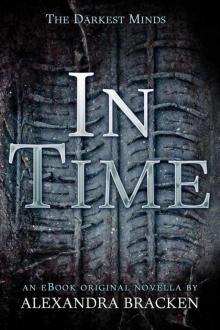 The Darkest Minds: In Time
The Darkest Minds: In Time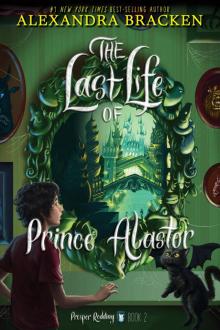 The Last Life of Prince Alastor
The Last Life of Prince Alastor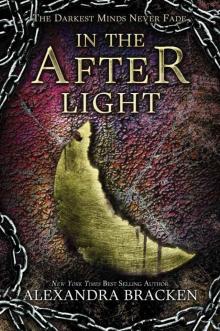 In the Afterlight (The Darkest Minds series)
In the Afterlight (The Darkest Minds series)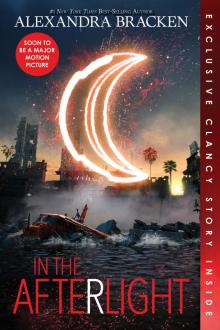 In the Afterlight (Bonus Content)
In the Afterlight (Bonus Content)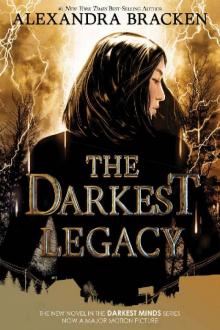 The Darkest Legacy (Darkest Minds Novel, A)
The Darkest Legacy (Darkest Minds Novel, A)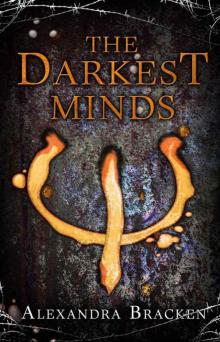 Darkest Minds (1) The Darkest Minds
Darkest Minds (1) The Darkest Minds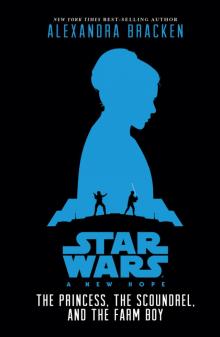 The Princess, the Scoundrel, and the Farm Boy
The Princess, the Scoundrel, and the Farm Boy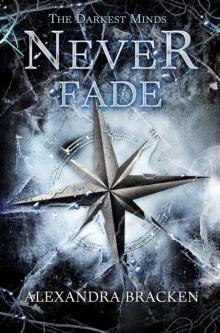 Never Fade tdm-2
Never Fade tdm-2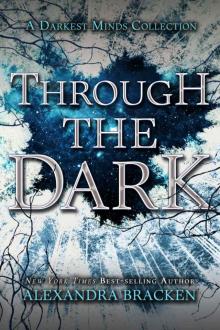 Through the Dark (A Darkest Minds Collection) (A Darkest Minds Novel)
Through the Dark (A Darkest Minds Collection) (A Darkest Minds Novel)